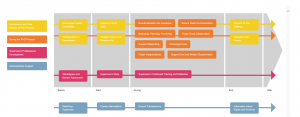Gender Sensitive PhD Supervision Toolkit – What?
The objective of this Toolkit is to create awareness of the way gender affects supervisory relationships and to minimize the negative effect of gendered interactional patterns. There is a growing body of international evidence which demonstrates that women within STEM have more negative experiences of PhD education and consequently are more likely to leave academia. This loss of talent represents a cost in terms of lost research and innovation and maintains the male dominated culture in STEM. This Toolkit aims to enhance high quality in supervision by offering approaches and tools which will create gender awareness, enhance learning and support students to navigate the PhD journey in a supportive environment.
There are many aspects and stages in the PhD supervision process: the research task; enculturation to academia; development of critical thinking; independence and the Supervisor/student relationship. We address several of the aspects which arise during the PhD programme and we offer recommendations for good practice. Gender issues can arise at any or all of the stages of a PhD. Addressing any one kind of bias contributes to a culture which challenges all kinds of bias and creates an inclusive learning culture. Many of the recommendations in the toolkit will benefit both women and men because they describe effective and high quality supervision practices.
Gender Sensitive PhD Supervision Toolkit – Why?
PhD education is a crucial period for young academics, it is their introduction to academic life and their decision to pursue an academic career is made during this critical period. PhD education is also crucial for universities, it represents an important contribution to a university´s research output and funding.
Historically PhD supervision has been perceived as an almost private activity between supervisor and student; however there is a growing trend towards PhD education as an institutional responsibility, with supervision as a specialized pedagogy which involves the development of transferable skills and competences in addition to research and the production of knowledge. There are growing numbers of PhD students internationally, and these students are more diverse (gender, age, ethnicity) than previously, and there is an increasing formalization of the PhD process to facilitate standardization internationally.
Thus the demands on supervisors are greater and this toolkit is a response to calls from PhD supervisors for training to deal with these additional and complex demands, as well as suggestions by supervisors and students for a positive supervision culture.
Many experienced supervisors emphasize that PhD supervision is a highly individual and complex task and approaches must be adapted to the individual student’s needs. The FESTA toolkit acknowledges this and does not offer a ‘one size fits all’ approach, but offers ideas and approaches for a gender aware and gender sensitive supervision that will hopefully contribute to an inclusive supervision culture.
Six FESTA partners were engaged in this task: institutions in Sweden, Denmark, Italy, Ireland, Germany and Bulgaria. This Toolkit for Gender sensitive PhD supervision is based on a documentary review as well as empirical data which emerged in study circles , focus groups, interviews and workshops with 63 PhD supervisors (29 M, 34 F) and 54 PhD students (18 M, 36 F) in the six participating partners.
For the PhD supervisor
This resource is a how-to, hands-on guide for gender sensitive PhD-supervision. It is written first and foremost with you – an active PhD-supervisor – in mind. It is a supplement to the many existing valuable general guides for PhD-supervision. The focus on gender is important because the PhD is the first step of an academic career. Being aware of gender sensitive PhD supervision practices will enhance opportunities for many promising talents – of any gender – and ensure inclusive learning cultures in which future scientific contributions can flourish.
The examples and practical recommendations are collected and developed in six different European contexts from active PhD-supervisors, PhD-students and administrators. Browsing through the resource we hope that you will discover a wide variety and diversity of what we consider both large and small best practice. Some are concrete examples from specific national contexts. Please feel free to adapt whatever you see here to suit your specific needs, challenges and context.
In many disciplinary fields, supervision is not only the responsibility of one supervisor but more a shared effort, and we encourage you to share this resource with your co-supervisors and your colleagues.
For the PhD students
As a PhD-student you are entitled to PhD supervision that will facilitate your achievement of your PhD and the development of transferable skills. This resource can provide you with ideas on many issues which commonly arise in the PhD process, e.g. expectations, feedback, communication and meetings. There are also tips on how to practice writing, and how to handle returning after leave, and even if these are presented here as recommendations for supervisors, feel free to turn them around and make them your own.
For the manager or administrator
As manager or administrator, you are concerned with providing as fair and professional a context as possible for both supervisors and students. This resource is a source of information about what is important to PhD-supervisors and PhD-students at various stages of a PhD-project – especially seen from gender and diversity points of view. In addition to dealing with PhD Supervision, it also provides examples and recommendations of many administrative aspects, which may have far-reaching implications for gender equality such as how to help switching supervisors, how to manage career interruptions, or how to support a good start. We hope this resource may provide you with insight and inspiration on best practices. Please feel free to adapt whatever you see here to suit your specific needs, challenges and context.

